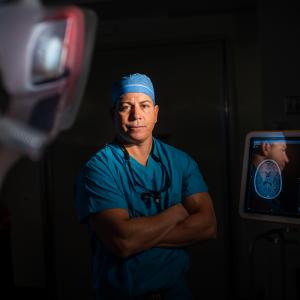
Between them, thoracic surgeons Dr. Robert J. Cerfolio and Dr. Michael Zervos have completed more than 3,000 robotic surgeries, advancing this treatment for lung cancer.
Photo: NYU Langone Health
Over the past decade, multiple studies have shown that robot-assisted surgery for lung cancer decreases postoperative morbidity, pain, and recovery time compared with thoracotomy; several reports indicate potential advantages over other minimally invasive techniques as well, including improved lymph node harvesting and less blood loss. NYU Langone Health is at the forefront of research and clinical innovation aimed at advancing this treatment modality.
Pioneering Robotic Approaches to Segmentectomy and Sleeve Resection
A growing body of evidence suggests that for early stage lung cancer with small tumors, segmentectomy can lead to greater patient quality of life than more extensive surgery, while producing comparable oncologic outcomes. In August 2019, researchers led by Robert J. Cerfolio, MD, MBA, director of clinical thoracic surgery and of the Lung Cancer Center at NYU Langone’s Perlmutter Cancer Center, and executive vice president and vice dean, chief of hospital operations, published a study in Annals of Thoracic Surgery reviewing a consecutive series of 245 of his patients who underwent this procedure robotically—the largest series of minimally invasive segmentectomy to date.
They reported a 100 percent R0 resection rate, and a median number of 17 lymph nodes resected by 5 N2 and 3 N1 stations. Median operative time was 86 minutes, and average length of stay was 2.1 days. Although 7 of the first 100 patients required conversion to robotic lobectomy, none of those conversions were for bleeding, and there were no conversions to lobectomy or thoracotomy thereafter. There also were no deaths by 30 or 90 days after the procedure. “Our study shows that robotic segmentectomy offers outstanding safety and perioperative outcomes,” Dr. Cerfolio observes.
Dr. Cerfolio has also pioneered robotic techniques for sleeve resection of the airway, one of the most challenging procedures in lung cancer surgery. In November 2019, he and colleagues presented a paper outlining these evolving methods at the Southern Thoracic Surgical Association annual meeting on Marco Island, Florida. The paper retrospectively reviewed Dr. Cerfolio’s robot-assisted sleeve resections from April 2013 to April 2019, following 23 consecutive patients—one of the largest known case series in the world for this procedure.
These patients underwent resection of the airway with or without pulmonary resection, pulmonary artery resection, or both. Median operative time was 211 minutes, median number of resected lymph nodes was 23, median length of stay was 3 days, and there were no deaths by 30 or 90 days after the procedure. At 18 months follow-up, no patients had an anastomotic stricture, and there were no recurrent cancers.
A First for New Robotic Lung Biopsy System
In September 2019, NYU Langone became the world’s first commercial site to perform a lung biopsy robotically, using Intuitive Surgical’s new Ion™ endoluminal system. Approved by the U.S. Food and Drug Administration earlier in the year, the Ion™ system enables minimally invasive biopsy in the peripheral lung, using an ultra-thin articulating catheter that can move 180 degrees in all directions. The catheter navigates through small and tortuous airways to reach hard-to-access nodules.
The biopsy was followed immediately by a robotic lobectomy. In addition to Dr. Cerfolio and Michael Zervos, MD, clinical associate professor in the Department of Cardiothoracic Surgery and chief of thoracic surgery and director of robotic thoracic surgery at Tisch Hospital and Kimmel Pavilion, the team on the Ion™ procedure included three interventional pulmonologists: Gaetane C. Michaud, MD, director of the Interventional Pulmonology Program; Samaan Rafeq, MD, clinical associate professor of medicine and cardiothoracic surgery, associate director of the interventional pulmonology, director of the Interventional Pulmonology Fellowship Program, and associate director of bronchoscopy at Tisch Hospital; and Jamie L. Bessich, MD, assistant professor of medicine and cardiothoracic surgery and associate director of interventional pulmonology.
Recognition for the Highest Quality of Care in Lobectomies
In 2019, NYU Langone Health earned a three-star rating from The Society of Thoracic Surgeons (STS) for its care of lung cancer patients who undergo lobectomy. This ranking denotes the highest category of quality among practices in the United States and Canada. Only 7 of 199 hospitals received a 3-star rating, which was based on an analysis of outcome data compared with the overall average for lobectomies performed by participants in the STS General Thoracic Surgery Database from January 2016 to December 2018.
These results reflect the expertise of NYU Langone’s thoracic team, which includes (in addition to the specialists previously mentioned) Harvey I. Pass, MD, the Stephen E. Banner Professor of Thoracic Oncology, professor of surgery, chief of thoracic surgery, and vice chair of research in cardiothoracic surgery; Costas Bizekis, MD, clinical associate professor of cardiothoracic surgery and director of general thoracic surgery at NYC Health + Hospitals/Bellevue; Bernard K. Crawford, MD, clinical associate professor of cardiothoracic surgery; and Amie J. Kent, MD, clinical assistant professor of cardiothoracic surgery and associate director of the Thoracic Surgery Residency Program.
At NYU Langone, approximately 98 percent of lung resections are minimally invasive procedures, as opposed to open techniques—one of the highest rates in the world. The effectiveness of the thoracic team’s approach is reflected by a variety of metrics. Surgeons at the Lung Cancer Center achieve exceptional rates of lymph node removal, averaging 25 from the right chest and 19 from the left (including 5 N2 and at least 2 N1 stations on each side). For lobectomies, the median blood loss is 20 mL, among the lowest on record. The median postoperative length of stay is two days, less than half the national average. The team reports a 30-day mortality rate of less than 0.2 percent for lobectomies—also a fraction of the norm.
Over the past 20 years, Dr. Cerfolio has performed nearly 18,000 lung surgeries, making him one of the most prolific practitioners in his field. He and Dr. Zervos have completed more than 3,000 robotic surgeries between them, and teach their innovative techniques to clinicians around the globe. “Patients come to us from every corner of the planet,” Dr. Cerfolio notes, “and hundreds of surgeons have come to observe the incredible technical expertise of our entire team.”

